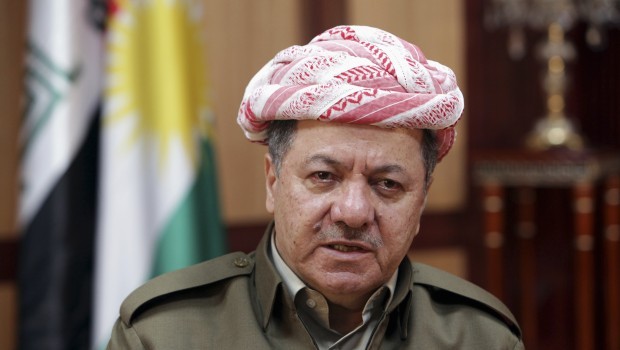
Kurdish Regional Government president Massoud Barzani smiles during an interview with Reuters in Erbil, about 220 miles (350 kilometers) north of Baghdad on June 2, 2013. (REUTERS/Azad Lashkari)
Erbil, Asharq Al-Awsat—In a letter sent to the members of the preparatory committee for the Kurdish National Conference that is due to take place on August 24, the president of the Iraqi Kurdistan Region, Massoud Barzani, called to form a commission of inquiry into massacres committed against Kurds living in Syria.
The Kurdish leader’s statement shows the considerable impact the Syrian crisis could have on the region’s sectarian and ethnic structure, especially since the Iraqi region of Kurdistan has always claimed to avoid being involved in Arab affairs.
Barzani said there are reports that “terrorists from Al-Qaeda are attacking the civilian population and slaughtering innocent Kurdish women and children.”
“If the reports are true, showing that citizens, women, and the children of innocent Kurds are under threat from murder and terrorism, Iraq’s Kurdistan region will make use of all of its capabilities to defend women and children and innocent citizens,” the letter went on.
Kurds make up approximately 10 percent of the Syrian population. They are mostly based in the northeastern parts of the country.
Over the past weeks, violent clashes erupted in northern Syria between Kurdish militants and radical Islamist rebels mainly affiliated with the Al-Nusra Front and the Islamic State of Iraq and Syria (ISIS). Kurdish fighters overtook Islamists and expelled them from several Kurdish-dominated cities in Syria, particularly the oil-rich city of Ras Al-Ayn along the Turkish border.
Barzani’s letter comes alongside reports of massacres committed against the Kurdish population in Tell Aran and Tell Hasel at the hands of Al-Qaeda-linked rebels militants despite the Democratic Union Party (PYD) had called for a truce to be held throughout the Muslim festival of Eid El-Fitr. The truce will end on Sunday.
Speaking exclusively to Asharq Al-Awsat, Saadi Piraa, member of the Patriotic Union of Kurdistan (PUK), said: “The brutal attacks against our Kurdish brothers on the Syrian side clearly aim to transform the conflict taking place there into a racist war between Kurds and Arabs.”
“This issue raises our deep concerns in the Iraqi Kurdistan region, because such clashes will lead the region into a real disaster that will only cause more destruction to the people of the region. We will make every political and diplomatic effort to prevent that from happening,” Pira said.
When asked whether Barzani’s comments may be considered as interference in Syrian affairs, Pira said: “What is happening now is that terrorist forces are interfering in Syrian affairs. Most of the radical Islamist elements currently present on Syrian soil belong to Al-Qaeda and commit crimes against the Syrian people, especially our Kurdish people.”
“Today we are facing a real threat represented by massacres committed against our people in Western Kurdistan [Syria], and there are signs in this regard, but we have not verified them. Therefore, a delegation from the preparatory committee for the Kurdish National Conference will go there under orders from the president to investigate the matter,” he said.
Pira continued: “If threats against our people proved to be true, it is our national and humanitarian duty to exert all our efforts and capabilities to defend our people there.”
When asked whether a military intervention is among the available options, Pira responded: “We will exert our diplomatic and political efforts in the first stage. However, if they do not work, there will be other options, which the region’s leadership will determine in order to deal with the threats.”
Hasip Kaplan, a Turkish MP for the Kurdish Peace and Democracy Party (BDP) revealed that “tens of radical Islamist elements cross the Turkish borders through Gaziantep and Antakya into Kurdish areas in Syria to participate in the declared war against Kurdish citizens in Syria.”

Trackbacks/Pingbacks